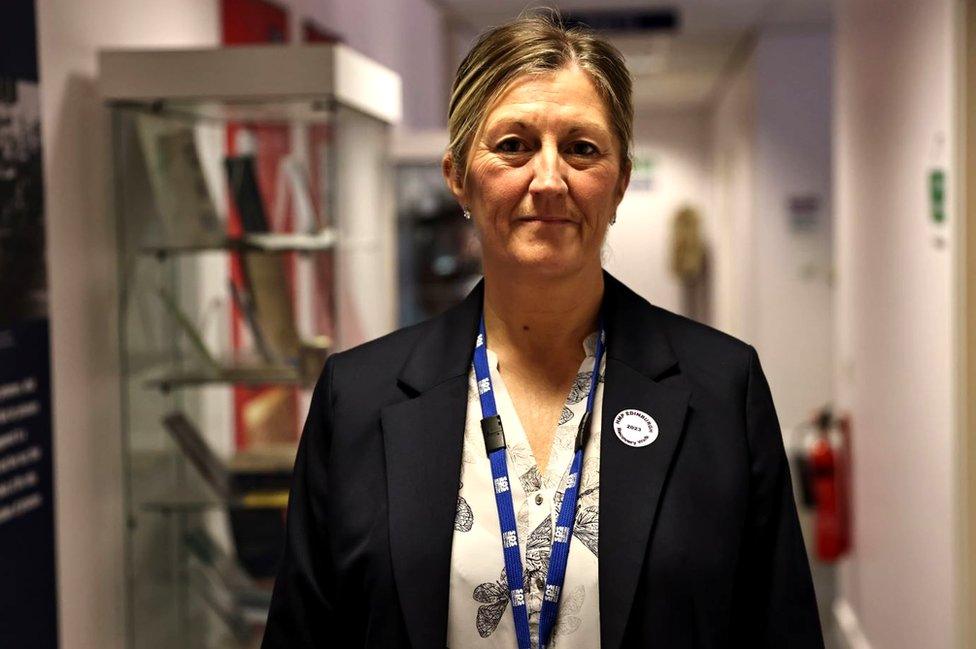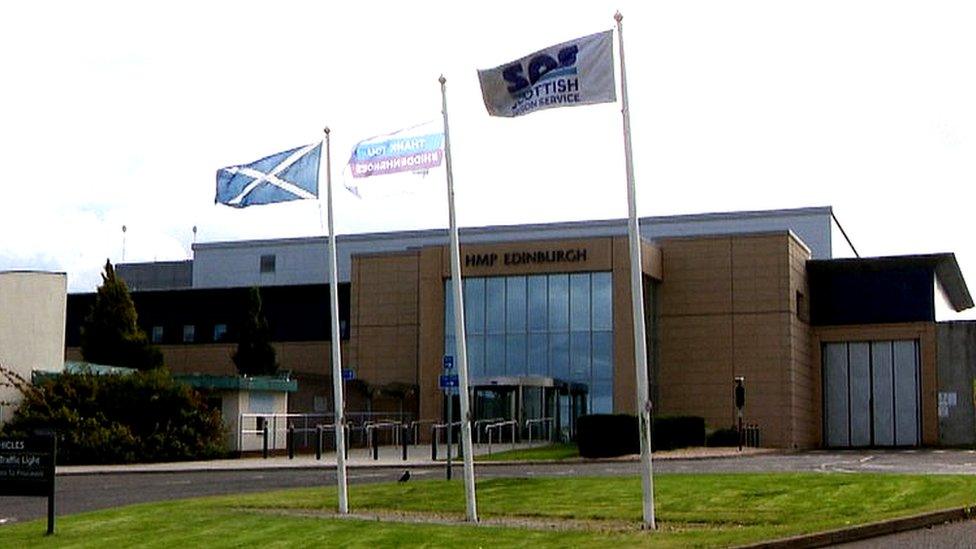Psychoactive drugs making inmates violent and aggressive
- Published
Security officer Dale Carter shows the BBC's Chris Clements drugs hidden inside protein shakes and razors
A new wave of psychoactive drugs smuggled into prisons is causing "aggressive and violent" reactions in inmates.
The new governor of HMP Edinburgh said prisoners taking synthetic drugs and new forms of "street" benzodiazepines were having extreme reactions due to their increased potency.
Fiona Cruickshanks also said the drug problem within the jail was evolving.
Drones are increasingly being used to smuggle drugs and weapons into prison.
Earlier this year, a craft crashed into HMP Edinburgh's grounds while carrying £75,000 worth of drugs, phones and knives.
Justice Secretary Angela Constance said the Scottish Prison Service (SPS) was working hard to "keep pace" with the changing drugs market.
Ms Cruickshanks told BBC Scotland News that there had been a growing shift in Scottish prisons from traditional narcotics - such as heroin and cocaine - to new psychoactive substances since 2017.
She said there was a particular problem with the "potency" of synthetic cannabinoids - known as "spice" - and the changing make-up of so-called counterfeit benzodiazepines.
"Individuals who will take substances can become unresponsive very quickly," she said.
"One minute, staff can be delivering CPR to an individual and, five minutes later, that same individual can be presenting as extremely aggressive, extremely violent and staff are having to deal with the two extremes within a matter of minutes.
"It's a really complex, a really challenging environment. It puts a lot of pressure on resources."

Fiona Cruickshanks, the new governor of HMP Edinburgh, said inmates could go from needing CPR to being aggressive in violent in a matter of minutes
Phil Fairlie, chairman of the Prison Officers Association Scotland, said the erratic prisoner behaviour Ms Cruikshanks described in relation to CPR could be "incredibly unsettling" for staff.
He told BBC Radio's Good Morning Scotland programme: "That's new. That is not a normal reaction to drugs inside prisons or prisoner behaviours.
"So it is really challenging and it can be frightening for some of the staff."
In 2022 drugs worth an estimated £900,000 were recovered across the prison estate. This included £285,000 at HMP Edinburgh.
Mr Fairlie said finding prisoners under the influence of drugs was a daily occurrence for staff across the country.
He added: "We do intercept and stop a lot of the drugs that go into prisons but it is far too lucrative a market for the organised crime gangs to give up."
Drones problem
Ms Cruickshanks - who took up her post at one of Scotland's largest jails last week - said prisoners using these drugs don't respond to the effects of overdose reversal drug Naloxone.
This has led to an increased number of ambulance callouts at Scottish prisons.
She added: "It puts a lot of pressure on internal NHS staff, the paramedics and obviously prison staff themselves."
Ms Cruickshanks said that the drugs market was "evolving and developing".
In recent years, Etizolam was the main ingredient in "street Valium" and involved in more than half of Scottish drug deaths between 2018 and 2022.
However, international controls on the drug mean the substance is now being replaced by Bromazolam, which was the subject of a public health alert earlier this year.
Ms Cruickshanks said that substance was now showing up in prisons.
She added: "The potency of that tablet is completely different. The saturation levels are completely different, so they will take what they think is the same amount.
"But it will have a completely different impact on them."

The governor of HMP Edinburgh says the prison is focused on recovery and disrupting the supply of drugs
Until last month, Ms Cruickshanks was the SPS's head of operations and public protection, with responsibility for stemming the flow of drugs into prisons as well as gang violence.
She said that while drugs were still being thrown over the perimeter fences and passed during visits at Edinburgh, the growing use of drones had become a "big problem".
Ms Cruickshanks said: "As technology evolves, there are people looking at more unique ways to introduce drugs into prison.
"We had a recent recovery in Edinburgh earlier in the year - the packages attached to the one drone that crashed in the prison grounds contained ceramic knives, a significant quantity of drugs, mobile phones and the prison value of the contents of that drone is £75,000.
"That was from one drone recovery, so it's a constant challenge for us."
Ms Cruickshank made the comments as she welcomed the Scottish government's justice secretary to HMP Edinburgh's annual recovery walk.
'Growing concerns'
The governor joined Angela Constance for a memorial service led by prison chaplains before the walk with prisoners around the grounds.
Ms Constance said the SPS had a "laser-like focus" on preventing drugs entering the system.
However, she added: "Within the prison population, as with the community at large, there are growing anxieties and concerns about the use of benzodiazepines.
"Some of these benzodiazepines are synthetic.
"It is difficult to establish what is actually within these illicit substances - that can cause greater harm and risk to people who are consuming substances where the ingredients are less established."
She said that HMP Edinburgh was "increasingly focused on recovery".
Ms Constance added: "We should do everything we can to disrupt the supply of drugs both within prisons and in our community.
"But we also need to be working to reduce demand for drugs and that's why the recovery work that is going on in this prison here in Edinburgh but also elsewhere in Scotland is so vital in terms of supporting prisoners on their road to recovery, but also on their road to rehabilitation."